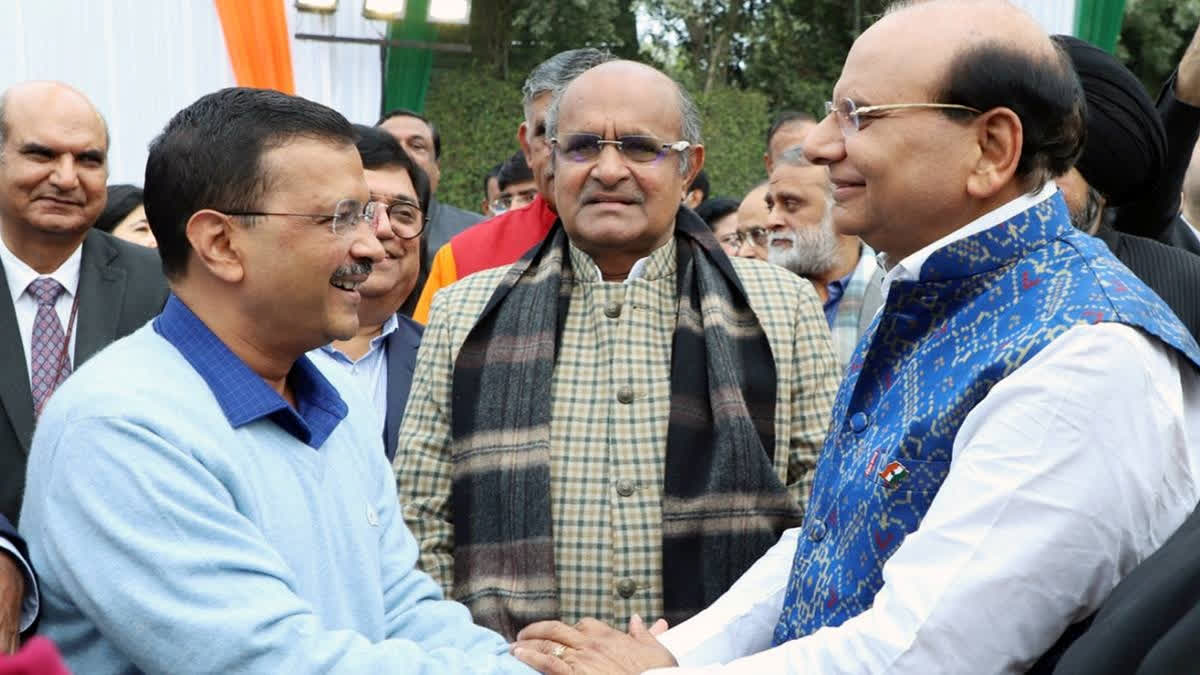New Delhi: The Supreme Court on Monday issued notice to the Centre on a petition by the Delhi government challenging the constitutionality of the Government of National Capital Territory of Delhi (Amendment) Ordinance, 2023, promulgated on May 19, 2023, regaining the control over bureaucrats and services in the capital. The top court declined to stay the ordinance and scheduled the hearing on the plea to stay the ordinance next week.
A bench headed by Chief Justice of India D Y Chandrachud and comprising Justice P S Narasimha told senior advocate A M Singhvi, representing the Delhi government, “It is an ordinance Dr Singhvi, we have to hear the matter...We issue notice on the request of Dr Singhvi and permission to amend the petition to implead the lieutenant governor as a party respondent...”
Arguing the petition, Singhvi said, "Imagine that the CM sits in a meeting with two bureaucrats and he is in the minority and those two will outvote the CM and then go to the L-G, who is a super CM". The bench said it would have to hear the matter while declining to stay the ordinance.
Also read: Delhi CM Kejriwal, Ministers drop plans to burn copies of Central Ordinance
Singhvi said 437 independent consultants with degrees from reputed international universities had been fired by the L-G and “see the number of times lordships have stayed an Act of Parliament, leave aside an ordinance”. Additional Solicitor General Sanjay Jain, representing the LG, submitted that these 400 employees were part-time workers sitting as consultants.
To it, Singhvi said, "How can the consultants be removed? Please stay this para about the appointment of consultants." He pointed out to the bench that their salary has been stopped. After hearing the arguments, the top court scheduled the matter for further hearing on July 17, and the court will also take up the Delhi government’s challenge to L-G's order terminating 437 private persons appointed as advisers, fellows, and consultants.
The Delhi government’s plea contended that the ordinance wrests control over civil servants serving in the Government of NCT of Delhi (GNCTD), from the GNCTD to the unelected Lieutenant Governor. "It does so without seeking to amend the Constitution of India, in particular Article 239AA of the Constitution, from which flows the substantive requirement that power and control in respect of services be vested in the elected government”, it said.
The state government emphasized that the ordinance destroys the scheme of federal, Westminster-style democratic governance that is constitutionally guaranteed for NCTD in Article 239AA. “The principle of collective responsibility in a democracy - incorporated in Article 239AA (6) - requires that the elected government be vested with control over officials posted in its domain," it said.
Also read: They should introspect their deeds: Congress on AAP asking it to clear stand on Delhi ordinance
On May 11, a five-judge constitution bench of the Supreme Court ruled that it is ideal to hold that a democratically elected Delhi government should have control over its officers, and the LG is bound by the advice of the elected government in everything other than public order, police, and land.
On May 19, the Centre brought an ordinance to set up a permanent authority known as the National Capital Civil Service Authority, whose chairperson will be Delhi chief minister along with the chief secretary, Delhi, Principal Secretary (Home), Delhi to make recommendations to the Delhi L-G regarding matters concerning transfer posting, vigilance and other incidental matters. However, in case of a difference of opinion, the decision of the L-G should be final.
The Delhi government’s petition said, “Ordinance is an unconstitutional exercise of executive fiat that: i.) violates the scheme of federal, democratic governance entrenched for the NCTD in Article 239AA; ii.) is manifestly arbitrary; legislatively overrules/reviews a Constitution Bench judgment of this court dated May 11…… without altering its basis, which was that accountability of civil servants to the elected arm of the government, and the elected government’s control over the civil service, is a substantive mandate of the model of governance envisaged by the Constitution, including for the NCT of Delhi under Article 239AA”.



